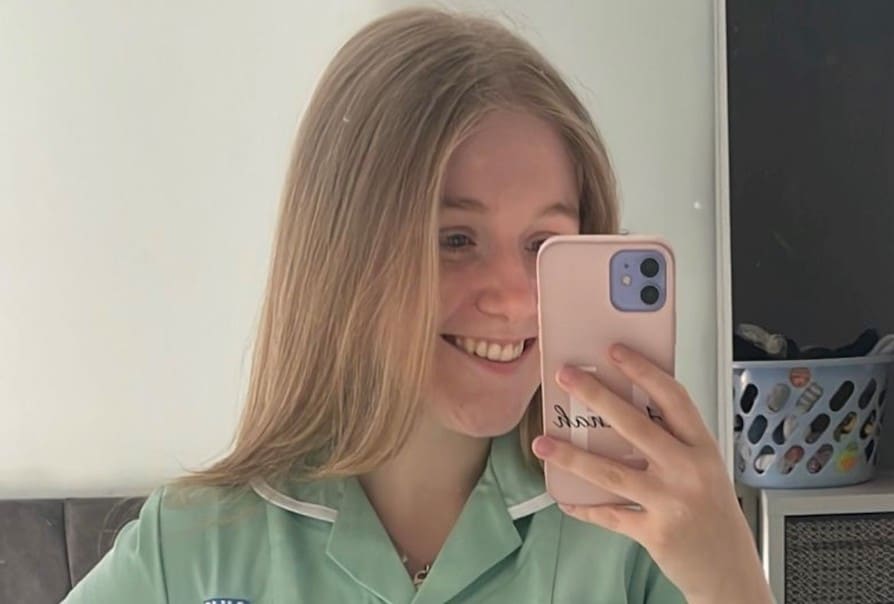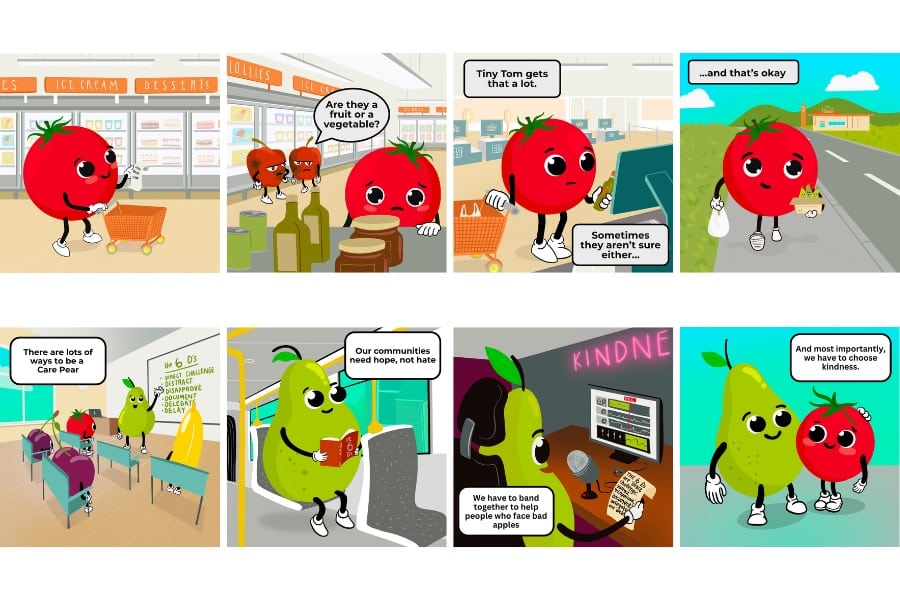The innovative NHS jobs programme helping people with autism into work
- Written by I Love MCR
- Last updated 10 months ago
- City of Manchester, Featured, Health & Wellbeing

An 18-year-old nursing assistant from Wythenshawe Hospital has shared how she began her dream career path, thanks to a NHS-supported internship programme.
Hannah Watts started her Supported Internship at Wythenshawe Hospital with Manchester College in September 2022.
This employment-based study programme gives students with special educational needs and disabilities the opportunity to develop life skills and improve their employability.
NHS supported internship programme
Hannah has autism, which qualifies her for the programme, but she has never let this define her.
“Since I was young, I always wanted to be in healthcare”, said Hannah. “I really looked up to my auntie who is a midwife, and it was something I wanted to do too.
“I like to look after people so I always aim to do something where I can care for others.
“My first placement on a maternity ward lasted for a year before my current manager heard how well I was doing and asked if I would do a placement on the Pulmonary Oncology Unit.
“After spending a couple of months here, she made me aware of a job vacancy coming up. I applied for it and was lucky enough to get the job, and I’ve been working full time ever since.
“I was so proud to tell my family that I now work in the NHS.”
An incredible initiative
Manchester University NHS Foundation Trust, who run Wythenshawe Hospital, has operated a Supported Internship programme for over ten years in partnership with local non-profit organisation Pure Innovations as well as The Manchester College, Trafford College and North Ridge High School.
The Trust now hosts around 40 interns a year across all their sites, making it one of the largest employer hosts in the country.
Hannah now works in the Pulmonary Oncology Unit at Wythenshawe Hospital, supporting patients after lung surgery or with underlying lung health issues, which can include end of life patients.
“In my current role, I deal with the personal care of patients on the unit,” she said.
“On a typical day I’ll deal with repositioning patients, I will provide them with their meals, and I will answer call bells if needed.
“I’ve learnt so much about topics I knew nothing about, like lung cancer, and every day I learn a new topic as I go along.
“I’ve obviously never done anything like this before in a ward setting, so it’s always interesting and the staff are so lovely. The work they do is amazing.”
The challenges of working with autism
Hannah’s autism has meant that work can be challenging sometimes, especially in such a fast-paced environment, but has praised her colleagues for being supportive in her development.
“My disability means I have to deal with different emotions every day and changes to routines,” she said.
“It can be tough to manage at times as we work in a very heated environment everything is happening at 100mph.
“It also means I can be unfiltered with people and that I can come across blunt, I don’t mean it’s just how it comes out. It sounds nice in my head, but it can come out the complete opposite.”
“On reflection, I understand that I said it very ‘Hannah’ and I’ll always make the effort to go and apologise afterwards.”
“My colleagues have been so understanding regardless, they all help to accommodate me, and I’m not made to feel any different to every other staff member.
“They get that coming here is a big thing for me, but they point out my mistakes and praise my successes like anyone else.
“They don’t see my autism. They just see Hannah.”
Jamie Bytheway is head of Widening Participation at Manchester University NHS Foundation Trust, which delivers programmes aimed at attracting and recruiting local people.
She said: “We’re so proud of Hannah and all of our interns who are now valued staff members at MFT, and it’s great to hear that Hannah had such a great experience.
“Typically, around 50-60% of learners gain paid employment at the end of their learning, many with MFT, which provides a blended, practical experience for young disabled and or neurodivergent people.
“National Supported Internship Day will be celebrated on Wednesday, 27 March and it’s the perfect time to recognise the achievements of many of our colleagues.
“We have and will continue to support many residents across Manchester through this programme”.
You can find out more information about Manchester University NHS Foundation Trust by clicking here
- This article was last updated 10 months ago.
- It was first published on 25 March 2024 and is subject to be updated from time to time. Please refresh or return to see the latest version.
Did we miss something? Let us know: [email protected]
Want to be the first to receive all the latest news stories, what’s on and events from the heart of Manchester? Sign up here.
Manchester is a successful city, but many people suffer. I Love Manchester helps raise awareness and funds to help improve the lives and prospects of people across Greater Manchester – and we can’t do it without your help. So please support us with what you can so we can continue to spread the love. Thank you in advance!
An email you’ll love. Subscribe to our newsletter to get the latest news stories delivered direct to your inbox.
Got a story worth sharing?
What’s the story? We are all ears when it comes to positive news and inspiring stories. You can send story ideas to [email protected]
While we can’t guarantee to publish everything, we will always consider any enquiry or idea that promotes:
- Independent new openings
- Human interest
- Not-for-profit organisations
- Community Interest Companies (CiCs) and projects
- Charities and charitable initiatives
- Affordability and offers saving people over 20%
For anything else, don’t hesitate to get in touch with us about advertorials (from £350+VAT) and advertising opportunities: [email protected]

Old nightclub at the heart of ‘Staly Vegas’ could be transformed into new food hall

How Sounds from the Other City became the UK’s most unforgettable independent festival

The shared ownership scheme that gave Fiona the family home she always wanted

How shared ownership can get you on the property ladder in 2025

Review: Strictly Come Dancing at the AO Arena is ‘joyous, slick and strictly brilliant’















